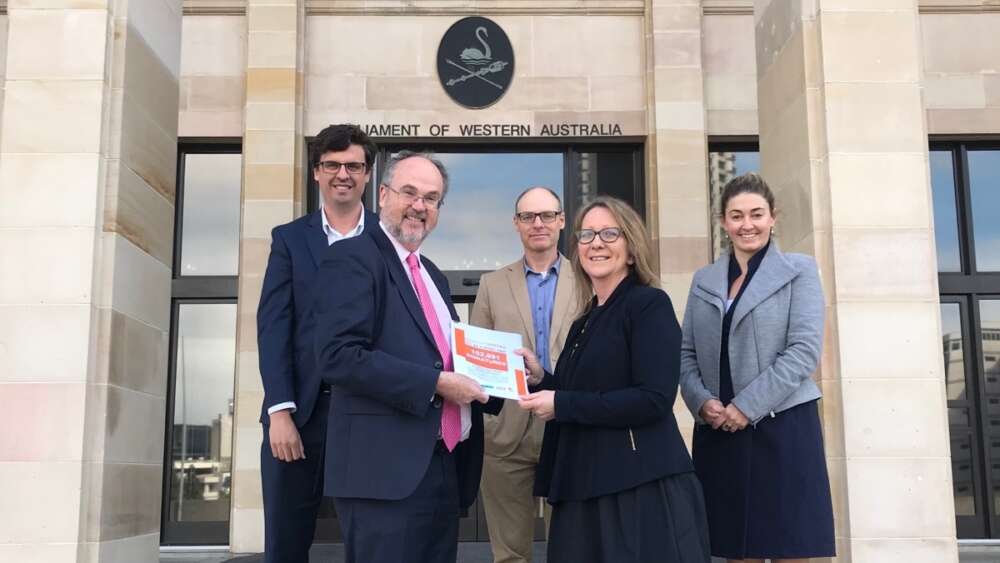Anti-slavery activists call on WA to update industrial laws
We need to learn from the past for the sake of the future
When Western Australia (WA) first passed Industrial Relations laws in 1912, and then revised them in 1941, horticultural and domestic workers received no protections. This particularly impacted Indigenous Western Australians, denying them access to basic freedoms.
Anti-slavery advocates say it’s well and truly time to change those laws.
NSW Premier urged to bring Modern Slavery Act into force
A virtual rally to end modern slavery in NSW is starting now
4000 slaves in Australia mean we have work to do
Anti-slavery laws get buried by NSW Government
On Tuesday, a coalition of advocates delivered a petition to the WA Minister for Industrial Relations Bill Johnston. They called on the state’s Parliament to pass the changes in the Industrial Relations Legislation Amendment Bill 2020.
‘It’s remarkable that over 100,000 global citizens, including almost 13,000 Australians, have signed this petition to support the global fight against modern slavery,” said Minister Johnston at the petition’s presentation.
‘This demonstrates how crucial it is that the McGowan Government’s Industrial Relations Legislation Amendment Bill 2020 swiftly passes Parliament.
“The important Bill will help better protect vulnerable workers, modernise our employment laws and bring Western Australia in line with the requirements of the International Labour Organisation’s Forced Labour Protocol of 2014.”
Proposed changes also would allow the Commonwealth to ratify the Protocol and fix anomalies which have allowed past injustices. Unions WA Acting Secretary Owen Whittle spelled this out: “Indigenous West Australians were effectively enslaved across much of regional WA, with men working, often entirely unpaid, as station hands and women in domestic work and too often subjected to sexual harassment or rape.”
“Today, WA is the only State or Territory in Australia with such a grossly unfair legal barrier to protection for domestic and horticultural workers.”
The petition was organised by Be Slavery Free and Freedom United with international partners.
‘These changes to the Industrial Relations laws will send a clear message that Western Australia is a place where people know their work is valued, said Carolyn Kitto from Be Slavery Free.
‘Forced labour is crime in Australia’s Criminal Code. More than the law, is it in our Australian values and culture to give people ‘a-fair-go.’
Kitto explained that the International Labour Organisation (ISO) already identified eight fundamental conventions which cover subjects considered to be fundamental principles and rights at work. The ILO Forced Labour Protocol (P29) was introduced in 2014. Over 45 countries have ratified it but, as yet, Australia has not.
“Protocol P29 is one of eight conventions specifically designed to reduce the number of people trapped on farms, in mines, factories, restaurants and homes where unpaid wages, forced labour and modern slavery often flourishes,” said Kitto.
It is estimated only one in every five cases of modern slavery in Australia is reported.
According to the Global Slavery Index more than 40 million people are trapped in modern slavery, with approximately 25 million in forced labour.
Forced labour – defined as “any work or service which people are forced to do against their will, under threat of punishment” – also occurs in Australia. Anti-Slavery Australia reported that, in 2019 alone, the organisation helped more than 225 people who had been trafficked to or from Australia, or they had faced slavery-like conditions while in Australia (including forced marriage, servitude and forced labour).
The organisation estimates only one in every five cases of modern slavery in Australia is reported, and warned: “Some groups of people are also more vulnerable than others. For example, backpackers, international students, asylum seekers and migrants on limited working visas may not know their rights in Australia.”
“Migrants and other high-risk groups often lack the necessary information to seek help, while employers and legal officials lack the information to recognise forced labor and adequately protect those in need,” explained Herrana Addisu from Freedom United.
“On both sides, there is insufficient education on the issue of forced labor and human trafficking. This creates opportunities for perpetrators to continue to exploit people unnoticed and unchallenged,’ he said.
Along with the practices of modern slavery, Australia also imports approximately $18 billion worth of products with risk of slavery in the supply chain. Some of these include cocoa, chocolate, fashion, tea and seafood.
While petition signatories urged the WA government to ratify Protocol P29, a similar campaign targeting federal legislators is also being run. In both campaigns, anti-slavery advocates urge Australia’s government leaders to play their part in a coordinated global movement intent on ending the scourge of modern slavery.
‘With the proliferation of modern slavery around the world, every time a country signs a protocol such as this, it makes it riskier and less lucrative for slave-traders to flourish,’ Kitto said.




